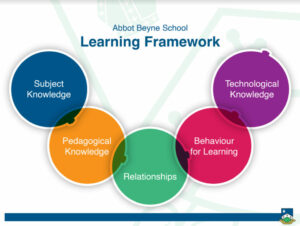The quality of learning and teaching is the most important aspect of any school. We are committed at Abbot Beyne School to providing the best possible learning experiences for all our students. Similarly, we strive to ensure that our teachers are on a continuous journey of self improvement. We have ensured that our CPD provision for teachers is derived from research-based best practice.
- Know their subjects inside out and have a passion for teaching that subject
- Use a range of research based best practices that enable students to learn effectively
- Build good relationships with students to enable them to learn effectively
- Instil effective routines for learning that support all students to achieve
- Use technology to support and stretch students while enriching their learning experiences
Consequently, our framework for learning is based around the following five areas:
Content knowledge
Pedagogical knowledge
Relationships
Behaviour for learning
Technological knowledge



